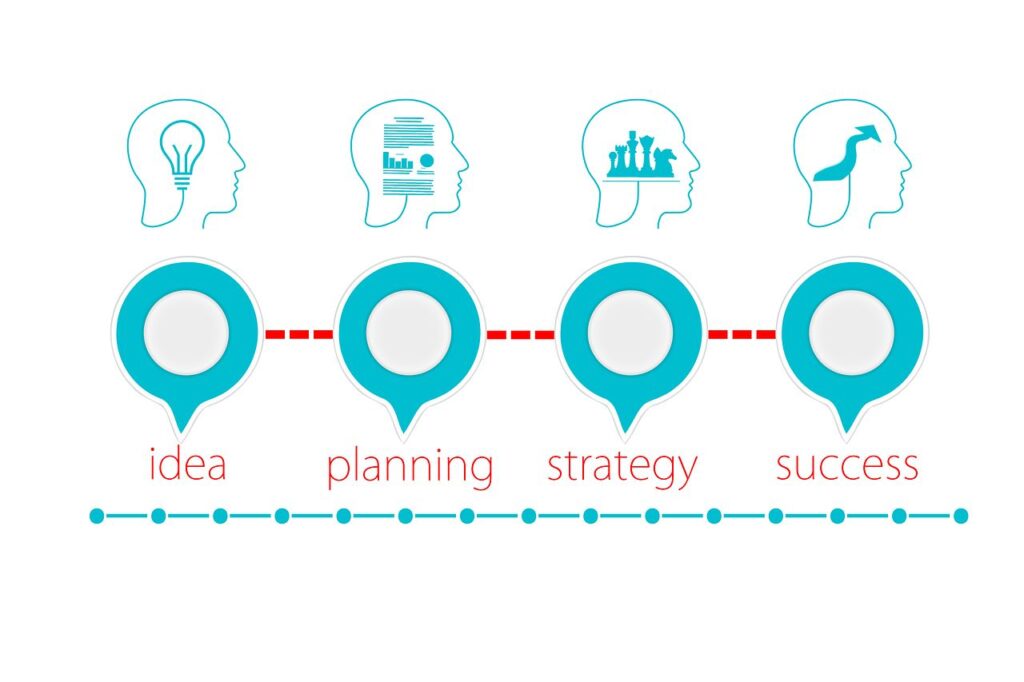Shaping the company's image is a task that should be on the priority list of every company. It is more than a logo that identifies a company, product or service. A strong brand image creates consumer confidence and stability in turbulent, mature and competitive markets. The big brands have no doubts about it. Isn't it worth taking advantage of their experiences?
What will you learn from the article?
Corporate image is no longer just an empty marketing slogan, but a key element of any brand's business strategy. In today's globalised world, where competition in every industry is fierce, it is the company image that often determines whether a customer chooses our offer or a competitor's. But what exactly is a company image and why should caring for it not be limited to theory? How do we effectively start creating an image that will attract customers and make them loyal to our brand? Do employees have an impact on the perception of the company in the market? We will analyse these questions, looking also at how image shaping affects the perception of a company as an attractive employer in practice and how selected brands handle this task. I invite you to read on, which will not only introduce you to these concepts, but also provide you with the tools you need to effectively manage your own company's image.
- What is company image?
- Taking care of the company's image not only in theory
- How to start creating the image of the company?
- What is shaping the company's image?
- Do employees have an influence on shaping the company's image?
- Shaping the company's image as an employer
- Shaping the company's image on the example of selected brands
What is company image?
Most entrepreneurs and small business owners don't really think about their brand image until there is a problem with it. You usually have to implement it at this stage crisis managementto save the day. Meanwhile, image shaping is an important part of your marketing strategy. The best way to build and nurture a strong brand image is through a multidisciplinary approach. An integrated marketing strategy means using both your own media (owned media), acquired media, as well as paid media. Consistently presenting your brand across all platforms can increase revenue by up to 23%.
Shaping the company's image - definition
Each company should strive to be best perceived in its environment. Forming a reputation, good opinion, prestige, reliability, quality, etc., does not self-create. Appropriate actions must be taken to shape the image of your company. In the past, no importance was attached to its image. Nowadays, however, it is necessary to pay special attention to it, due to the multitude of competitors and increasing consumer expectations.

Company image is the image that every consumer has in their mind about a given company, its products and services. It is also the company's reputation as perceived by consumers. The image plays a significant role in the company's success. If you create a positive image of your company, you have a chance to survive on the market as well as be better than your competitors.

Remember that there is also the concept of brand image! They are not the same concepts. Because the brand image is a narrow concept, it covers only a group of products or a single product. The company's image, in turn, applies to the entire activity of the organization.

Taking care of the company's image not only in theory
Shaping the company's image these are long-term actions through communication, selection, brand promotion or use of symbols. What shapes the image of your company are activities such as: financial results, developing innovative products, acting in accordance with values, responding appropriately to criticism of the company, customer service, treating employees with respect. There are hundreds of such actions that can be listed.
What is most important is to draw attention to the fact that these activities can be assigned to all elements of the marketing mix. Therefore, it is impossible to briefly describe what shaping a company's image is. This includes a number of different activities that will help you attract your consumers. However, before you move on to specific actions, it is worth starting by asking yourself the question: how to start shaping the company's image?

First: focus on the internal image, that is, on employees, suppliers, investors and stakeholders. The following activities are important: efficient communication (information flow), an appropriate attitude of superiors to their subordinates, motivating employees, work atmosphere, employee development or working conditions. These elements are the strength of the internal image. Shaping the company's image in this aspect will be based primarily on employees, because they decide about the activities of the organization, they are its future and an opportunity for development and further functioning. If your employees are satisfied with their work, it will certainly translate into the results of your company.
Second: the external image. Dariusz Tworzydło in "The matrix of image goals in the process of assessing the effects of public relations" indicates important elements included in this concept. Namely:
- customer relations,
- building a brand image,
- products and their quality,
- credibility and honesty,
- social commitment.
Shaping the company's image through the prism of the external image is not an easy task. Each company tries to attract consumers, so you need a lot of commitment so that the customer notices you, not your competitor. Philip Stoyanov in "Corporate social responsibility and corporate image building" shows why shaping the company's image is so important. The most important goal is to create positive attitudes towards the organization of current and future customers of products and services. It is worth remembering that a properly created image of the company can become a competitive advantage, increase sales, build consumer loyalty and attract new investors.
Once you are aware of what shaping the company's image is, you must now move on to concrete actions. Knowing is not enough - the most important thing is to act.

So, how can I create the image of my company? Ira Kalb, a respected economist, indicates the stages of taking action in turn:
- Mission statement - you need to define what your company does, who is the target group, what makes your company unique.
- Visual identification tools - you need to create: name, logo, slogan, colors, font, etc.
- Training - train your employees to communicate your company's mission through word of mouth and social media
- Promotion - Broadly promote your mission and identity tools to people outside the company.
- Measuring Results - It is imperative to measure how effectively your corporate image is performing.
How to start creating the image of the company?
In order to properly shape the image of your company, you need to be aware of what it really is. Briefly the image of the company "how it is perceived by all entities in the environment in which it operates, this is the opinion expressed by its clients, employees and contractors. " - explains Budzyński in "Shaping a Parallel Image". Dziadkiewicz-Ilokowska in "The fair as a tool for creating the company's image" adds that "it is the personality of the organization, built thanks to the organizational culture, management style, attitudes of employees and leaders. "
How to properly create the company's image? First of all, you need to understand a number of factors that affect your image. These include: "Factors of a rational nature (knowledge, experience, awareness), social nature (social norms, professed values, social imitation), but also it arises as a result of actions of rational elements (expectations, wishes, prejudices, fears and fears, hopes, antipathy." - explains Jolanta Zrałek in "The importance of the image of the company in consumer choices (in the light of rationality).
Each of the above factors must be analyzed how it can affect your business. Each company is different, and so is the environment in which it operates. Only when you thoroughly familiarize yourself with your surroundings will you be able to shape them properly. How to do this? Shaping the company's image may take place using such elements as: "past experiences resulting from the operation of the company, its financial successes, market stability, product quality, export successes, good opinion among employees, or the presented level of social responsibility. " - points out Jefkins in Public Relations.
Budzyński adds to the above list: "company identity, marketing communication, product brand image, internal communication and public relations. " In turn, Cenker in "Public relations" also mentions: "philosophy, organizational culture, history, mission, strategy, management style, reputation, identity, product quality, sponsorship activities."

So you can ask yourself: shaping the company's image - what do I need it for? Gackowski in "Methods of image research in the media" indicates that "the image of the company is built in order to distinguish it from the competition, gain a strong market position and attract as many customers as possible. " It is your company's image that determines whether consumers will want to buy from you or your competitor. Only the appropriate shaping of the company's image can increase loyalty to the organization. Image is an extremely important link in marketing activities. Without him:
- it's hard to maintain a high position on the market,
- Your customers will go to your competitors,
- your sales will drop significantly, and so will your profits.
What is shaping the company's image?
Shaping the company's image requires meeting several requirements. The first step is to identify your target audience, which is comprised of a variety of external and internal groups, including customers, partners, and employees. When defining your audience, you have to be very specific. Each one target groupto which the company addresses its message must be precisely defined. Only this allows you to create an effective marketing strategy that will directly respond to the unique needs of your customers. The next step is to define your critical business goals - you need to know where you are going before you get there. Shaping the company's image without knowing your short- and long-term business goals is ineffective and wastes valuable resources.
Once you have identified your key audiences and critical business goals, you can begin to build your brand personality. It should appeal to customers and express the most important distinguishing features of the brand and product advantages. For this purpose, you need to develop key messages, the most important messages, and then match them with the audience. Key messages will be the most important insights your audience will leave behind after interacting with your brand.
A recognizable brand to which customers become loyal?
We will help you build such an image.
Do employees have an influence on shaping the company's image?
Brand development involves a complex and multi-level approach to showing the world what your company represents. It explains how its products are delivered to customers and what their experiences are with them. It also includes the "why" behind customer purchasing decisions. More importantly, brand development enriched with shaping the company's image helps to stand out from the competition. Creates a recognizable brand to which customers become loyal. Companies in every industry must remember about their customers, but it is also important to involve employees in shaping the company's image.
It makes sense: If part of your brand identity is how customers receive your product or service, the employees who deliver it - whether in real time or behind the assembly line - undoubtedly influence the entire process. Research by Employer Brand International shows that 84% companies believe that a clearly defined strategy is the key to achieving their branding goals. In other words, it's time to start educating all employees about branding and brand strategy. It is the company's responsibility to ensure that the actions taken are in keeping with the brand's promise. Ultimately, it is up to employees to stick to it and deliver it to customers.
Shaping the company's image as an employer
Over 90% people would consider leaving their job if offered a position at a company with an outstanding reputation. Shaping the company's image as a desirable employer has many advantages. One of them is the ability to attract talented employees to the company, even if the people the company is interested in work elsewhere. As many as 92% employees would at least consider changing their employer if they were offered employment in a company that is perceived as a good place to work. On the other hand, creating a negative employer brand can cost the company a lot. 55% job seekers admit they gave up applying for a job after reading a negative review about an employer. Therefore, talent acquisition will be a big challenge for a company with a bad reputation as an employer.
Employer branding it is also important in social media. 82% people are more likely to trust a company whose top executives actively use social media. The vast majority of people will trust the company more if senior employees are present on social media. Of course, for executives to contribute to branding, they need to mention their workplace in a positive context. Almost all business owners understand the importance of creating a positive work environment and disseminating information about it. Therefore, almost 69% employers collaborate with marketing departments on this task.

And now the icing on the cake. The network is full of former employees who have a negative opinion about the former employer. However, single negative opinions do not prejudge anything. The 62% of job seekers changes their perception of the company after an employer responds to these types of reviews. It's reassuring that more than 60% people are interested in listening to both sides when forming their own opinions.
Shaping the company's image on the example of selected brands
Why reinvent the wheel or create an open door? There are many entities around us who, knowing how important it is to shape the company's image and that it is worthwhile to do so. The effects can be seen with the naked eye - these are brands that have achieved success. It is worth taking advantage of their experience and learning from the best, perhaps avoiding a few mistakes. Let's analyze the tactics of some of the most influential brands in the world.
Apple. When you say that name, you probably think of Stevie Jobs who was a true visionary. However, Apple only became really successful when it focused on the simplicity and great design of its products. Now millions of enthusiasts of this brand will not even touch other products. Even for those who are somewhat locked in the Apple ecosystem, it is difficult to switch to something else.
Microsoft. Bill Gates created the best operating system of his time. Even so, he didn't start selling Microsoft computers. Instead, it licensed Windows to all the other computer manufacturers on the market. Shaping his image in this way was much more lucrative for him. He used the power of other companies to get his company to make billions of dollars.
Google. The company put all its energy into building a product finder that would be more useful to users than anything else. Now, when someone talks about searching for something on the Internet, you automatically think of the Google home page.
McDonald's. Everyone knows McDonald's doesn't serve the best food. It doesn't change the fact that people still choose to eat in this place instead of any other restaurant. McDonald's branding is so effective because it offers its customers a sense of security. Each of us feels safe knowing exactly what we are buying, no matter in which restaurant belonging to the chain we buy a burger and fries.
Image building further examples
IBM. Do you even know what exactly IBM does? If you ask random passers-by, they will probably also have trouble answering. The vast majority of them, however, have probably heard about the company. IBM has done an excellent job of focusing shaping the company's image specifically on its target market.
Facebook. If Mark Zuckerberg had opened the doors of Facebook right away to the whole world, we would probably still be using Our Class. The creator of this social networking site was deliberately slowly developing the brand. By restricting access to Facebook, he made people talk about it, and everyone desperately wanted to set up an account on it.
Toyota. When people think of Toyota, they expect an inexpensive and reliable car with cheap spare parts. The company knew, however, that it would not allow it to remain in the lead of car manufacturers forever. Looking at the market with prospects, they started to produce hybrid cars. Today they sell more of them than any other hybrid manufacturer. Toyota has based its image formation on promoting itself as an environmentally friendly brand.
Samsung. While Samsung has a rich history, its fame only blossomed into full splendor as it began to resist shaping the company's image by labeling itself anti-Apple. Most of the people who hate Apple want an Android phone. Samsung is a leader when it comes to smartphones and tablets with this operating system. Currently, the brand is considered the main rival of Apple.
BMW. German precision is a term that has entered our dictionary like another proverb. The professionalism, diligence and the highest quality of workmanship attributed to the German nation have been adopted by BMW, creating itself as a brand distinguished by the skills of the entire country. Therefore, when someone buys a BMW, they are convinced that this car was built with perfect precision.
What do these examples show? Most people can build a small business, but if you want to transform yours into something bigger, you need an essential ingredient. You have to be able to create a brand that everyone loves and that everyone talks about.
The importance of a positive company image cannot be overestimated
A company's image is one of the most important factors influencing its market position and its ability to attract customers and talent. Examples of companies with a positive market perception, such as Apple or Google, show how crucial it is to build a recognisable brand and take care of its reputation. It is worth emphasising that an employee's impact on a company's image is huge - every employee, from specialists to management, can influence the perception of the company by those around them. For example, a positive attitude towards customers, a culture of teamwork or openness to innovation create an atmosphere that builds trust and loyalty.
A good corporate image not only attracts customers, but also makes the company more attractive to potential employees. Employees feel a sense of pride in belonging to an organisation that is valued in the market, which influences their commitment and efficiency. Building a positive image is a process that requires consistency, communication and authenticity. The importance of a positive corporate image in today's business world is enormous and cannot be overstated. Shaping a company's image is a comprehensive image-building process that requires consistency and ongoing commitment across all aspects of the business. From marketing communications to customer service to corporate social responsibility, all these elements of a company's image work to build a positive perception among customers, partners and employees.
In today's world, where opinions spread at the speed of light on social media, effective corporate branding can be crucial to the success of any brand. Therefore, the process of image building and nurturing the positive elements of a company's image should be at the forefront of the strategy of any business that wants to thrive and grow in the marketplace.
Worth knowing:
What are the key factors and strategies that can be used to successfully build a positive corporate image?
Building a positive image of the company is one of the key challenges for every company. To create an image that will attract customers and bring success, you need to use the right strategies. An important factor is the care for the quality of the services or products offered, which affects the level of customer satisfaction. It is also important to convey a consistent and clear message about the company's values, goals and mission. What influences the company's image? Appropriate activities in the marketing area, social media and relations with customers and employees are also an important element of image building. It is also extremely important to monitor opinions about the company and respond appropriately to emerging criticism or problems. Effective building of a positive image of the company therefore requires proper attention to many different factors, but an effective strategy will certainly bring success.
What activities and initiatives can help build the company's trust and reputation in the eyes of customers, employees and the local community?
Nowadays, a company's reputation plays a key role in establishing relationships with customers, employees and the local community. What influences the company's image? Trust is one of the most important values to develop. However, in order to build a credible image, it is worth focusing on many different initiatives. A good way may be to be active in social media, thanks to which we will have the opportunity to communicate with our clients in a quick and easy way. It is also important to build positive relationships with employees, because their satisfaction has a direct impact on the quality of the services we provide. What's more, regular support for local initiatives and charity activities is another way to build a positive image in the eyes of recipients.

